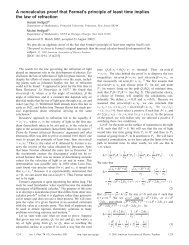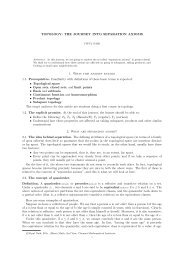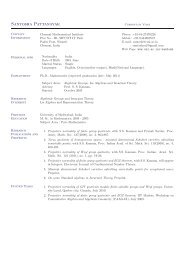Hermitian Analogue of a Theorem of Springer - Chennai ...
Hermitian Analogue of a Theorem of Springer - Chennai ...
Hermitian Analogue of a Theorem of Springer - Chennai ...
You also want an ePaper? Increase the reach of your titles
YUMPU automatically turns print PDFs into web optimized ePapers that Google loves.
HERMITIAN ANALOGUE OF A THEOREM OF SPRINGER 787<br />
PROPOSITION 4.1. Let k be a p-adic field containing all pth roots <strong>of</strong> unity<br />
and let l be a ramified quadratic extension <strong>of</strong> k. Then there exists a central<br />
di�ision algebra o�er lŽŽ t.. <strong>of</strong> degree a power <strong>of</strong> p, which has an in�olution <strong>of</strong><br />
the second kind.<br />
Pro<strong>of</strong>. Let A be a central simple algebra over lŽŽ t.. which is in<br />
Ž ŽŽ ... 2 Br l t . Let � denote the image <strong>of</strong> A in H ŽŽŽ.. l t , � .<br />
p p . Then A<br />
supports an involution <strong>of</strong> the second kind which is identity on kŽŽ t.. if and<br />
2 only if N Ž � . � 0 �S, p. 309, <strong>Theorem</strong> 9.5 �.<br />
Therefore to prove the<br />
lŽŽ t..� kŽŽ t..<br />
proposition, it is enough to show that N 2 lŽŽ t..� kŽŽ t.. is not injective. We have<br />
the following commutative diagramme<br />
2 Ž . 2 ŽŽŽ.. . 1 Ž .<br />
0 � H l, � � H l t , � � H l, ��p� �0<br />
p p<br />
�<br />
2 2 1<br />
Nl�k NlŽŽ t..� kŽŽ t.. Nl�k<br />
�<br />
Ž . Ž ŽŽ .. . Ž .<br />
2 2 1<br />
0 �H k, �p �H k t , �p �H k, ��p� �0<br />
with exact rows. By the local class field theory N 2 is an isomorphism.<br />
l � k<br />
Therefore, by the snake lemma, we have<br />
�<br />
ker N 2 � ker N 1 Ž lŽŽ t..� kŽŽ t.. . Ž l� k . .<br />
Thus, it is enough to show that N 1 l � k is not injective. Since k contains all<br />
1Ž . 1Ž . p<br />
pth roots <strong>of</strong> unity, we have H k, ��p� � H k, � � k*�k* . Similarly<br />
p<br />
1Ž . p 1<br />
H l, ��p� � l*�l* and the map Nl� k corresponds to the map N:<br />
l*�l* p � k*�k* p induced by the norm map N l � k:<br />
l* � k*. Since l�k is<br />
ramified, the order <strong>of</strong> the finite group l*�l* p is greater than that <strong>of</strong><br />
k*�k* p . In particular, the map N is not injective. This proves the proposition.<br />
EXAMPLE 4.2. Let p be an odd prime number and let k be a p-adic<br />
field. Let l be a ramified quadratic extension <strong>of</strong> k. Let D be a division<br />
algebra over lŽŽ t.. <strong>of</strong> degree a power <strong>of</strong> p, with an involution � <strong>of</strong> the<br />
second kind. Such a division algebra exists by 4.1. Let � � k* be such that<br />
� is not a norm from l*. Let h � ² 1, ��: be the rank 2 hermitian form<br />
over Ž D, � . .<br />
THEOREM 4.3. Let k, l, D, � , and h be as in 4.2. Then h is anisotropic<br />
o�er D, and there exist finite extensions K and K <strong>of</strong> kŽŽ t.. 1 2 such that K1 is a<br />
quadratic extension, K 2 is an extension <strong>of</strong> odd degree, and h is isotropic o�er<br />
D � K for i � 1, 2. In particular, the group UŽ h. kŽŽ t.. i<br />
<strong>of</strong> isometries <strong>of</strong> h is<br />
anisotropic o�er kŽŽ t.. and isotropic o�er K and K .<br />
1 2<br />
Pro<strong>of</strong>. Suppose that h is isotropic over D. Then, there exists u � D*<br />
Ž .<br />
such that � � u� u . By taking the reduced norm on both sides, we get






